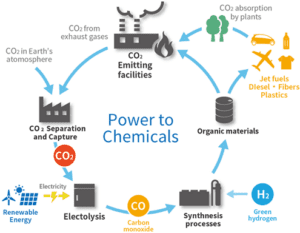Toshiba Energy Systems & Solutions Corp., Toshiba Corp., Toyo Engineering Corp., Idemitsu Kosan Co., All Nippon Airways Co. (ANA) and Japan CCS Co. have reached an agreement to begin reviewing recycling business models for reuse of CO2 from sources such as exhaust gases into Sustainable Aviation Fuel (SAF) via Power-to-Chemicals (P2C) processes, using technologies developed by Toshiba Corporate Research & Development Center which convert carbon dioxide (CO2) to carbon monoxide (CO) through electrolysis.

Power-to-Chemicals is a carbon capture and utilization (CCU) and carbon recycling technology that uses renewable energy and renewable hydrogen energy to recycle CO2 by converting it into resources with high environmental value. (Source: ANA)
These reviews will identify challenges and future business models leveraging each company’s expertise, technologies, and plant facilities for supply chains that will deliver SAF. Specifically, the companies will review the possibilities for streamlined SAF supply chains from upstream to downstream, using renewable energy and hydrogen to produce SAF out of CO2 which is separated and captured from sources such as exhaust gases of industrial emitters, and subsequently supply this fuel for flights in aviation.
Various eco-friendly innovations will be needed to achieve the CO2 emissions reduction targets indicated in Japan’s Nationally Determined Contribution*4 for the Paris Agreement. These include separation, storing and recycling CO2, making renewable energies into mainstream power sources, expanding the use of hydrogen, and decarbonization of fuels. In the aviation industry, the International Civil Aviation Organization (ICAO) has also defined CO2 emissions reduction targets in its Carbon Offsetting and Reduction Scheme for International Aviation (CORSIA), and strongly urges stable production and supply of SAF since using it in aviation is one effective means of meeting these targets. With its high CO2 emissions reduction capability, the P2C process offers great potential as a next-generation technology for producing SAF out of CO2.
These companies will be jointly reviewing future SAF supply chain business models, with the aim of realizing a sustainable society.